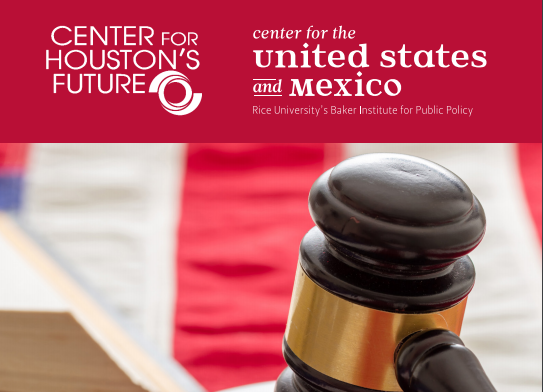Seven Steps Congress and the Biden Admin Should Take to Fix Immigration System
 Experts on immigration policy discussed the current state of immigration in the US and deliberated solutions to modernize the US immigration system during a recent workshop hosted by the Center for Houston’s Future and Rice University’s Center for United States and Mexico. The workshop placed emphasis on proposing attainable immigration policy solutions to improve the US economy and reduce the unauthorized immigrant population in the US.
Experts on immigration policy discussed the current state of immigration in the US and deliberated solutions to modernize the US immigration system during a recent workshop hosted by the Center for Houston’s Future and Rice University’s Center for United States and Mexico. The workshop placed emphasis on proposing attainable immigration policy solutions to improve the US economy and reduce the unauthorized immigrant population in the US.
The Immigration Policy Workshop Report highlighted how 35 years of inaction on reform and the resulting failure of the US immigration system to reflect our nation’s economic realities has led to many of the problems our nation faces today. For example, because the US immigration system lacks legal methods for “less-skilled” migrants to come and fill US labor needs in industries like construction, agriculture, food processing, and hospitality, we now have millions of unauthorized immigrants working in those industries.
Participants in the workshop defined the following seven logical policy recommendations that the Biden Administration and Congress should take to improve the US immigration system:
Recommendation 1: Resolve the status of DREAMers. This includes expanding eligibility and mechanisms like parole-in-place and providing permanent legal status and/or a path to citizenship.
Recommendation 2: Pass legislation that provides less-skilled workers with more legal routes to U.S. entry, including temporary work authorizations and a path to legal status for certain subgroups of undocumented immigrants, such as essential and agricultural workers, parents of U.S. citizens and legal permanent residents, and long-term undocumented immigrants residing in the United States who meet certain requirements and contribute to the American economy.
Recommendation 3: Increase funding to the Executive Office for Immigration Review (EOIR), providing support for—among other things—more staff to address the current backlog of 1.3 million cases on the docket and reduce the average 830-day per case wait time for a court hearing. Many cases could be easily adjudicated with the appropriate resources, contributing to a more efficient and effective immigration court system.
Recommendation 4: Eliminate per-country caps for employment-based visas and continue to reform employment-based visas, including consideration for all kinds of labor market needs.
Recommendation 5: Conduct a comprehensive review of the U.S. visa system to expand visa types and index each visa type to shifts in the nation’s labor market. This will provide flexibility for workers to enter and leave the U.S. as needed.
Recommendation 6: Implement robust interior and border enforcement priorities in line with current immigration realities that should uphold family unity.
Recommendation 7: Define and operationalize the concept of border security, removing an argument that prevents many legislators from committing to immigration reforms.
These recommendations are sensible first steps that lawmakers should focus on to develop a well-functioning immigration system.
Improving the efficiency of the legal immigration system will benefit the US economy, which is currently suffering from workforce shortages and experiencing rising costs of services and goods. Doing so will also help improve national security and prevent future illegal immigration, especially when combined with robust interior and border enforcement priorities.








